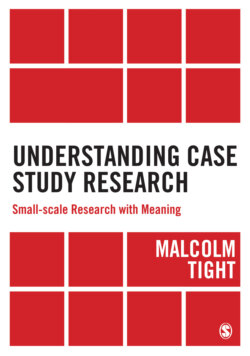Читать книгу Understanding Case Study Research - Malcolm Tight - Страница 13
На сайте Литреса книга снята с продажи.
Case Study in Different Disciplines
ОглавлениеSwanborn (2010) identifies several disciplinary sources of importance in the development of case study:
The growth and development of many sciences, such as the health sciences, clinical psychotherapy and law [not usually considered a science], went hand in hand with the study of cases…
A specific source of inspiration in social science is constituted by the traditional study of a village or local setting in cultural anthropology…
A third source is the sociological Chicago School…
In political science, historical roots include a strong tradition building on case studies…
Well-known from the field of psychology are the studies of Sigmund Freud and other psychoanalysts. Later on, the study of individual persons (cases) on other domains, such as personality psychology and clinical psychology, developed.
More recently, the study of cases in many policy fields (e.g. social work, youth support, labour market intermediary, the integration of ethnic minorities) presents new impulses. (p. 11)
In other words, there are many diverse ‘traditions’ of case study research, which have been developed and pursued often with little reference to, or even knowledge of, each other. This is, however, by no means unusual in academic research. What case study means, therefore, in political science will be at least subtly different from what it means in sociology (as will the sources referred to), and significantly different from its practice in disciplines which are further removed, such as psychotherapy or health care.
The importance of case study to a range of disciplines has been maintained up until the present day. It is particularly evident (and prevalent) now in the business/management area; for example, in accounting (Cooper and Morgan 2008), industrial marketing management (Beverland and Lindgren 2010), international business (Piekkari, Welch and Paavilainen 2009), operations management (Voss, Tsikriktsis and Frohlich 2002), public administration (Barzelay 1993) and small business studies (Chetty 1996).
Outside the business/management field, case study is most closely associated with other professional disciplines, which have come to dominate provision in most universities and colleges. The most prominent, after business/management, are health/medicine (Jones and Windholz 1990; Lukoff, Edwards and Miller 1998; Yin 1999) and education (Snyder 2012; Stenhouse 1979). Other professional disciplines with strong traditions and current usages of case study include development (Vellema, Ton, de Roo and van Wijk 2013), information systems (Cavaye 1996; Dube and Pare 2003), law (Caulley and Dowdy 1987) and social work (Lee, Mishna and Brennenstuhl 2010).
Case study research is not, however, as already indicated, solely the preserve of professional disciplines, but is also widely practised in what might be termed the ‘pure’ (as opposed to applied) disciplines. These include geography (Curtis et al 2000), philosophy (Ruzzene 2012), political science (Gerring 2006), psychology (Stewart and Chambless 2010) and sociology (Burrawoy 1998).
Some of the studies referenced offer practical guidance on how to apply case study in the discipline in question, while others offer surveys of the ways in which case study has been applied. Examples of case study analyses from different disciplines, and from around the world, including those referred to here, will be presented and discussed in more detail in Chapter 5.
